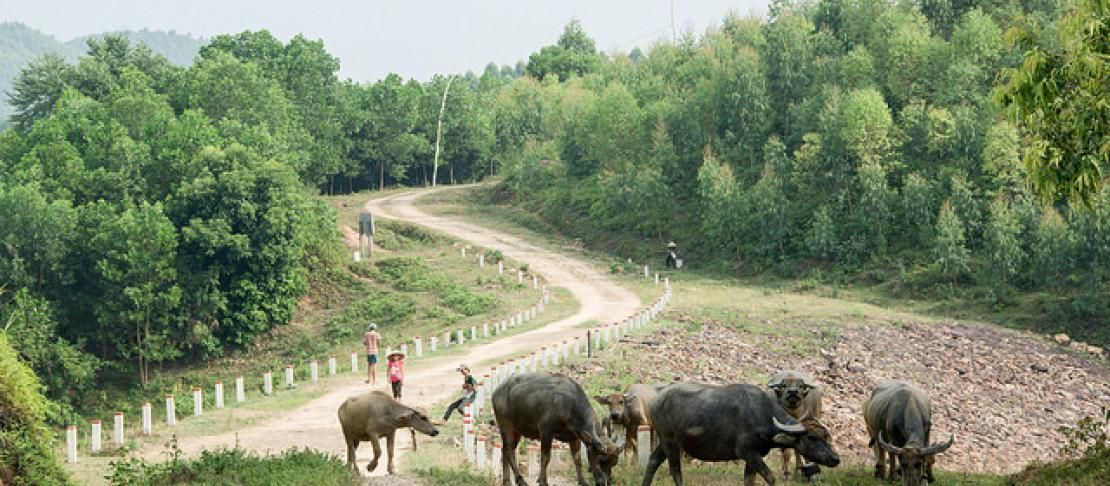New Climate-Smart Village in Vietnam tackling climate change in agriculture

On Wednesday, February 24th, a project will be launched in Ma village, in Vietnam’s northern Yen Bai District, as part of a region-wide initiative to tackle climate change in agriculture. The Climate-Smart Village of Ma is one of two climate-smart villages in Vietnam, chosen due to its vulnerability to specific climate challenges in the region including drought, cold snaps and declining soil fertility.
The project, entitled: “Integrated agricultural technologies for enhanced adaptive capacity and resilient livelihoods in climate-smart villages (CSVs) of Southeast Asia,” is led by the International Center for Tropical Agriculture (CIAT) for the CGIAR Research Program on Climate Change, Agriculture and Food Security (CCAFS), in partnership with authorities of Yen Bai district, Yen Binh province, Vinh Kien commune and local research for development partners.
During the launch, research activities will be explained and discussed among farmers, researchers and local authorities, and a cross-visit will be organized to Muoi village, Mau Dong commune, Van Yen district, Yen Bai province, where successful demonstrations of the practices are already underway.
Five model techniques to improve climate-smart practices
“We’ve listened to key stakeholders and partners about how to effectively tackle climate change at local level; now we’re in the process of identifying technologies which farmers can adopt to improve their resilience to the impacts of climate change,” said Bui Le Vinh, the project coordinator from CIAT.
Five local practices have been identified as climate-smart, and these will be improved and built upon with science-backed information and technology provided by all partners in the project, implemented by farmers. Model practices include fisheries intensification, cassava-grass strip forages planted on sloped land, and improved livestock production.
During the visit, participants will have the opportunity to interview farmers who have improved their cassava yields and soil fertility by intercropping cassava with grass strips, which can also be fed to cattle and fish for improved income.
The practice of growing grass forages among cassava also mitigates soil erosion by forming terraces which prevent run-off during rainfall. The grasses allow the soil to build up, improving soil health and structure, allowing more water to penetrate the soil and provide higher nutrient stocks for plants. Cassava as an intercrop has improved income generating opportunities throughout the year for farmers, since many other crops cannot grow on sloped land, especially where soil fertility is already low.
Voice from farmers and other community stakeholders
Having seen unsustainable cassava mono-cropping systems in the past, the government of Van Yen initiated the adoption of cassava-grass strips from a finished project in the region. With grass varieties provided by CIAT in 2002, it promoted the cassava-grass campaign in some of the 17 communes of the district.
Starting in 2002 with 1,000 hectares of cassava-grass strips and 2,200 hectares in 2003, there are now 6,700 hectares of forages successfully planted in the district of Van Yen. These sustainable practices were spread mainly through community loud speakers and via field demonstrations. Farmers also have played a role in disseminating the techniques and knowledge to peer farmers to follow.
This project is set to build on local partnerships to foster a better understanding of climate change, its impacts and potential solutions or adaptation measures, among farmers and key stakeholders in the community, to more effectively tackle climate change.
Climate change is projected to contribute to significant variations in rainfall patterns in the region, increased incidence of severe weather events, higher temperatures and sea-level rise in many highly populated areas. These changes are expected to adversely affect agricultural yields, biodiversity, forest harvests and availability of clean water.
Click here for more information about Climate-smart villages.
For more information please contact Bernadette Joven, CCAFS Southeast Asia Communications Specialist <b.joven@cgiar.org>
The Research Program on Climate Change, Agriculture and Food Security (CCAFS), is a CGIAR initiative that will address the increasing challenge of global warming and declining food security on agricultural practices, policies and measures through a strategic collaboration between CGIAR and Future Earth. Led by the International Center for Tropical Agriculture (CIAT), CCAFS brings together the world's best researchers in agricultural science, climate science, environmental and social sciences to identify and address the most important interactions, synergies and trade-offs between climate change and agriculture. CCAFS Southeast Asia (SEA) is hosted by the International Rice Research Institute (IRRI).
The International Center for Tropical Agriculture (CIAT) – a member of the CGIAR Consortium – develops technologies, tools, and new knowledge that better enable farmers, especially smallholders, to make agriculture eco-efficient – that is, competitive and profitable as well as sustainable and resilient. Eco-efficient agriculture reduces hunger and poverty, improves human nutrition, and offers solutions to environmental degradation and climate change in the tropics. With headquarters near Cali, Colombia, CIAT conducts research for development in tropical regions of Latin America, Africa, and Asia. CIAT is the lead center of CCAFS. www.ciat.cgiar.org
CGIAR is a global research partnership for a food secure future. Its science is carried out by the 15 research centers who are members of the CGIAR Consortium in collaboration with hundreds of partner organizations. www.cgiar.org